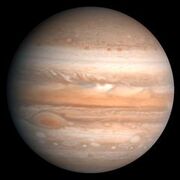This article is about the planet Jupiter. For the Roman god named Jupiter, see the following: Zeus; Jupiter (god)

Jupiter is the fifth planet from the Sun and the largest planet within the solar system. It is two and a half times as massive as all of the other planets combined, and has an apparent magnitude of -2.8. There are also at least 79 moons. The planet is named for Jupiter, the King of the Roman Gods who was also the deity of thunder and lightning.
Jupiter has an estimated 95 natural satellites, though how many of them qualify as "moons" is debated. The largest are the four Galilean Moons, catalogued by Galileo Galilei in 1610 - Io, Europa, Ganymede, and Callisto, all named after lovers of the god Jupiter.
Jupiter in "La Différence"[]
Jupiter was a mesmerizing sight in the skies of its moon Io what with its ever changing cloud patterns and storm systems. It appeared forty times as wide and four hundred times as bright as the Moon as seen from the Earth. This meant that the side of Io that faced Jupiter did not have a truly dark night except for the few hours in every 42.5 where Jupiter eclipsed the Sun.
Jupiter in In the Presence of Mine Enemies[]
In 2010, the German Reich began exploring the possibility of sending a manned mission to certain of Jupiter's moons. Most doubted that it would ever get out of the talking stage.
Jupiter in "The Road Not Taken"[]
Jupiter was the first planet the Roxolan ship Indomitable observed upon entering our solar system in 2039. While yellow, banded planets like this had poisonous air, looking along a line between it and the Sun would soon lead to other planets.[1]
References[]
- ↑ See e.g. Kaleidoscope pg. 173, mpb.
| ||||||||
| ||||||||||||||||
| |||||||||||
